Fruit Diet For Weight Loss: Benefits, Risks, & Meal Plan
Fuel your health and fitness with a wide array of colorful fruits!

Image: Shutterstock
In a world where fad diets come and go every day, the fruit diet is here to stay. The diet promotes the intake of fruits along with nuts, seeds, and selective vegetables. It cuts out a few food groups and may help improve cardiovascular health, reduce oxidative stressi An imbalance between free radicals and antioxidants in the body that leads to cell and tissue damage , and aid in weight management (1). However, while it does provide a vast array of health benefits, it has its own challenges too.
In this article, we will learn about the principle behind this diet, its benefits, potential shortcomings, and a meal plan to help you get started. Continue reading.
 At A Glance: Fruit Diet
At A Glance: Fruit Diet- Principle: Consumption of fruits, nuts, and seeds
- Purpose: To aid in weight loss and improve general health
- Who It Is For: Individuals who want to lose weight
- Duration: Short-term
- Who Should Avoid: Pregnant or breastfeeding women and those with type 1 diabetesi A chronic disease where the pancreas produces little or no insulin and causes symptoms like hunger, fatigue, and frequent urination
- Cons: May lead to nutrient deficiencies if followed for extended periods
In This Article
What Is The Fruit Diet?

A fruitarian or fruit diet promotes the intake of fruits and nuts and seeds in their natural forms. Some vegetables that are classified as fruits, such as avocados and tomatoes, are also allowed (2). The diet also severely restricts other food groups like animal products and grains.
One benefit of this diet is that it does not require a lot of meal preparation. Also, the elimination of unhealthy fats and inclusion of fiber-rich foods may help improve metabolic health (3).
 Did You Know?
Did You Know?The benefits of a fruit diet can be appealing. But before you embark on it, you need to know how it works. Learn more in the next section.
Key Takeaways
- The fruit diet promotes the intake of fruits, nuts, and seeds while excluding major food groups like animal-based foods and unhealthy fats.
- It may help improve cardiovascular health and aid in weight management.
- Long-term adherence to this diet may lead to nutrient deficiencies and low energy levels.
How Does The Fruit Diet Work?
The fruit diet works on the following principles:
- Consumption Of Fruit
The diet primarily focuses on consuming a wide variety of fruits like apples, bananas, berries, citrus fruits, etc. Some fruitarians even prefer organic or locally sourced fruits as they are believed to contain lower levels of chemicals and preservatives.
- Exclusion Of Major Food Groups
A strict fruitarian diet excludes or severely limits other food groups like animal products (meat, dairy, eggs), grains, legumes, and processed foods. The sustainable and eco-friendly nature of this diet also appeals to people.
The fruit diet is flexible and allows you to customize it as per your preferences and health goals. In the next section, we have discussed how you can follow this diet.
How To Follow The Fruitarian Diet
Start by eliminating the following food groups, one by one, from your diet. This gradual progression will allow your body to adjust to the changes and ensure you can adhere to it easily.
- Alcohol
- Dairy products
- Seafood
- Animal products
- Legumes
- Processed foods
- Caffeine
- Carbonated drinks
You can slowly start adding the following foods to your diet:
- Fresh, unprocessed fruits
- Nuts
- Seeds
- Vegetables
Focus on getting more than 50% of your daily calories from fruits and the rest from vegetables, seeds, and nuts. Follow this diet properly to enjoy the following benefits.
How The Fruit Diet Benefits Your Health
- It Boosts Your Nutrient Intake
A fruit diet is rich in vitamins A, B6, C, and E, iron, phosphorus, zinc, and fiber (4). These nutrients help improve metabolism and even boost cognitive function (5), (6), (7).
- May Improve Digestion
The high fiber content in fruits may help improve gut motilityi The movement of food from the mouth, throat, esophagus, stomach, small and large intestines, and out of the body and reduce constipation, abdominal pain, and bloating (8), (9).
- May Boost Cardiovascular Health
Intake of fruits like apples, grapes, pomegranates, blueberries, avocados, etc. may improve lipidi Fatty compounds that are a part of the cell membranes and help maintain cell structure and energy storage levels and reduce inflammation. This may help improve your heart health and reduce the risk of stroke (1).
- May Slow Down Aging
Fruits like oranges, berries, grapes, and cherries are rich in antioxidantsi Natural or man-made compounds that help combat free radicals in the body and delay cellular aging and bioactive compounds that may help combat oxidative stress, slow down cellular aging, and improve overall skin health (10).
- May Aid In Weight Management
Fruits are generally low in calories and high in water and fiber. This may help improve metabolic health and aid in weight management. The phytochemicalsi Chemical compounds found in plants that may help reduce the risk of diseases like diabetes, cancer, and heart issues in fruits were found to lower fat mass and help reduce obesity risk (11).
- May Reduce Gastric Cancer Risk
The high antioxidant and vitamin C content in fruits may suppress the growth of gastric cancer (12). However, more research is warranted in this regard.
While we have already discussed what foods you can eat on this diet, we have elaborated on them further in the next section. Continue reading.
Foods To Eat On The Fruit Diet
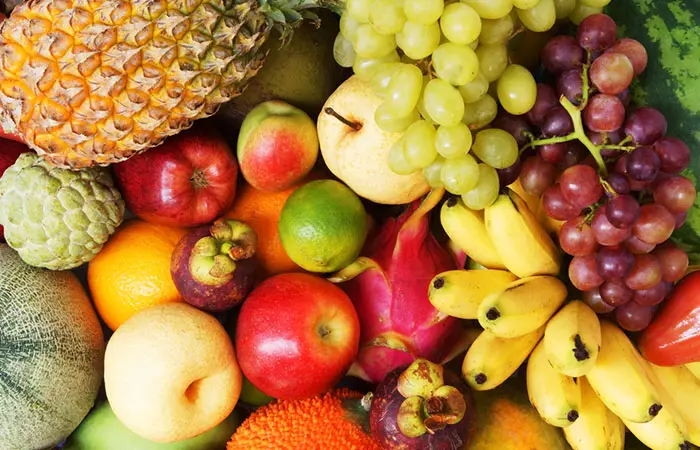
- Citric Fruits: Oranges, berries, tomatoes, grapefruit, plums, and cranberries
- Sweet Fruits: Figs, dates, grapes, and raspberries
- Fibrous Fruits: Bananas, apples, pears, strawberries, grapes, apricots, and cherries
- Oily Fruits: Olives, avocados, and coconuts
- Starchy Fruits: Plantains, kiwi, guavas, and squash
- Vegetables: Bell peppers, tomatoes, and eggplant
- Seeds: Sunflower and pumpkin seeds
- Nuts: Pine nuts, hazelnuts, and cashews
- Spices: Pepper, salt, cumin, nutmeg, and chili
You may also include other locally and organically grown fruits in your diet. But more importantly, you also need to avoid certain foods.
Foods To Avoid On The Fruit Diet

Slowly eliminate these foods from your diet as you transition into the fruit diet:
- Animal Products: Red meat, poultry, seafood, dairy, and eggs
- Grains And Cereals: Wheat, rice, oats, and other cereals
- Legumes: Beans, lentils, and other legumes
- Processed Foods: Fast food, packaged snacks, and sugary desserts
- Added Sugars: Soda, candies, and fruit juices
- Alcohol: All alcoholic beverages
While knowing what to eat and avoid on this diet can help, we have further simplified things for you. Check out the 3-day sample meal plan to help you get started.
3-Day Fruit Diet For Weight Loss
| Breakfast | Lunch | Dinner | |
| Day 1 | 1 bowl of mixed fruit salad made with 1 apple, a handful of berries, 2 slices of melon, and 15 to 20 grapes | 1 cup of mixed fruit salad made with a handful of cherries, 1 banana, 2 slices of watermelon, and 1 cup of sauteed squash and bell peppers | 4 pineapple slices and 1 cup of baked and spiced cherry tomatoes |
| Day 2 | 1 glass of fruit smoothie made with 1 cup of mixed berries, 1 small banana, and a handful of pine nuts | ½ bowl of fruit salad made with 1 avocado, 1 mango, and 2 tablespoons of lime dressing with a side salad of ½ sliced cucumber and 4 cherry tomatoes | 1 baked apple with a dash of cinnamon and 1 bowl of diced watermelon and cherry tomatoes |
| Day 3 | 1 diced kiwi with 4 slices of pineapple and a handful of raw pine nuts | 1 bowl of diced papaya, 6 strawberries, and a handful each of blueberries and nuts | 1 bowl of fruit kebabs made with 1 cup of grapes, 6 strawberries, and 2 slices of pineapple |
This sample plan can help you kick-start your weight loss journey. However, check out the next section if you are looking for a more extensive diet plan.
7-Day Fruit Diet Meal Plan
| Breakfast | Lunch | Dinner | |
| Day 1 | 1 cup of mixed berries and 1 small apple | 2 cups of fruit salad | 2 grilled pineapple slices and ½ cup of fruit sorbet |
| Day 2 | 1 medium banana and 1 cup of papaya | 1 bowl of mango and avocado salad with a lime | 1 baked apple with cinnamon and a drizzle of honey with 3 slices of watermelon |
| Day 3 | 1 glass of mixed fruit smoothie made with 1 cup of mixed berries and 1 small banana | 1 bowl of kiwi and pineapple slices | 1 serving of fruit kebabs |
| Day 4 | 1 cup of mixed berries and 1 small orange | 2 cups of fruit salad | 1 bowl of sliced kiwi and strawberries |
| Day 5 | 1 glass of smoothie made with 1 cup of mixed berries and 1 small banana | ½ cup of mango and papaya slices | 1 serving of fruit kebabs |
| Day 6 | 2 peach slices and 3 watermelon slices | 1 bowl of grapefruit and pear salad | 1 apple, 1 pear, and 1 cup of diced watermelon |
| Day 7 | 1 glass of mixed fruit smoothie made with 1 cup of mixed berries and 2 plums | 1 bowl of peach and papaya salad | 1 sliced mango with a sprinkle of chili powder and ½ cup of fruit sorbet |
It is recommended that you consult a doctor or dietitian for a customized diet plan. Also, while the fruit diet offers many benefits, it also may pose certain risks. Learn about them in the next section.
Potential Risks Of The Fruit Diet
- May Lead To Nutritional Deficiencies
The fruit diet eliminates major food groups. This may lead to deficiencies of protein, omega-3 fatty acids, iron, zinc, and vitamin B12 (2). These deficiencies, as a consequence, can cause reduced appetite and night blindnessi A type of vision impairment where people have trouble seeing well at night or dimly lit places like movie theaters and increase the risk of anemiai A condition that develops due to lack of red blood cells and can lead to fatigue, pale skin, and dizziness , depressioni A mood disorder characterized by a persistent feeling of sadness, changes in appetite, and loss of interest , and dementiai Loss of memory, thinking, and problem-solving ability that interfere with your daily life activities (5), (13).
- May Result In Obesity-Related Diseases
A fruit diet is high in simple sugars and may increase the risk of weight gain and heart disease in certain individuals (11). However, whether this effect applies to other individuals is yet to be studied.
- May Not Be Sustainable
The fruitarian diet is highly restrictive as it eliminates major food groups. This makes it difficult to sustain.
- May Spike Blood Sugar Levels In Some Individuals
The high sugar content in oranges and bananas may elevate blood sugar levels. Hence, this diet may not suit those with diabetes (2).
Karin Littleton, a nutritionist and health coach, says, “I’m keen to encourage everyone to up their intake of fruits, nuts, seeds, and veggies. It’s generally not wise to cut out whole food groups. There might be specific circumstances where a health professional or dietitian advises doing so, but always under careful supervision. I advocate for boosting your portions of fruits and vegetables, including legumes and beans, and suggest moderating—not eliminating—fats and meats, except in cases of allergies or intolerances. This highlights the importance of tailored, expert advice to meet your unique dietary needs.”
You now know the benefits and potential risks of this diet. However, the possible advantages can be appealing. But how long do you need to wait before you can see results?
How Long Does The Fruit Diet Take To Show Results?
A study published in the journal Nutrients discusses how increased fruit intake led to a significant reduction in body mass index and waist circumference in obese participants after 8 weeks (11).
Another study found that eating 2 or more servings of fruits per day may reduce the risk of stage-1 hypertensioni A medical condition where the blood force against the artery walls is so high that it increases the risk of stroke and heart disease thanks to their rich potassium content (16), (17).
However, there is no information on the duration it may take before one can see results from this diet. Also, the limited options available and its restrictive nature make this diet suitable only for the short term. Consult a doctor or registered dietitian for a customized diet plan to ensure your nutritional needs are met.
The fruit diet focuses on the intake of fruits, nuts, and seeds while excluding all other food groups. It may help improve cardiovascular health, slow down aging, and aid in weight loss. However, its restrictive nature may cause nutritional deficiencies and may not suit those with diabetes. Hence, consult a healthcare professional or registered dietitian for a sustainable diet plan to ensure your nutritional needs and health goals are met.
Frequently Asked Questions
How long can I follow a fruit diet?
The duration may vary from person to person and is based on an individual’s health and nutritional needs. Consult a dietitian for more clarity in this regard.
Is the fruit diet suitable for children?
The fruit diet is not suitable for children as its high sugar content may lead to weight gain and increase the risk of obesity (11). The diet’s exclusion of food groups may also increase the risk of malnutrition in kids.
Can I drink coffee or other beverages while on the Fruit Diet?
No, it is advised to avoid drinking coffee when following a fruit diet. Moreover, both coffee and fruits are acidic in nature which may cause problems if you already experience acid reflux or abdominal discomfort (18).
Illustration: Fruit Diet For Weight Loss: Benefits Risks & Meal Plan
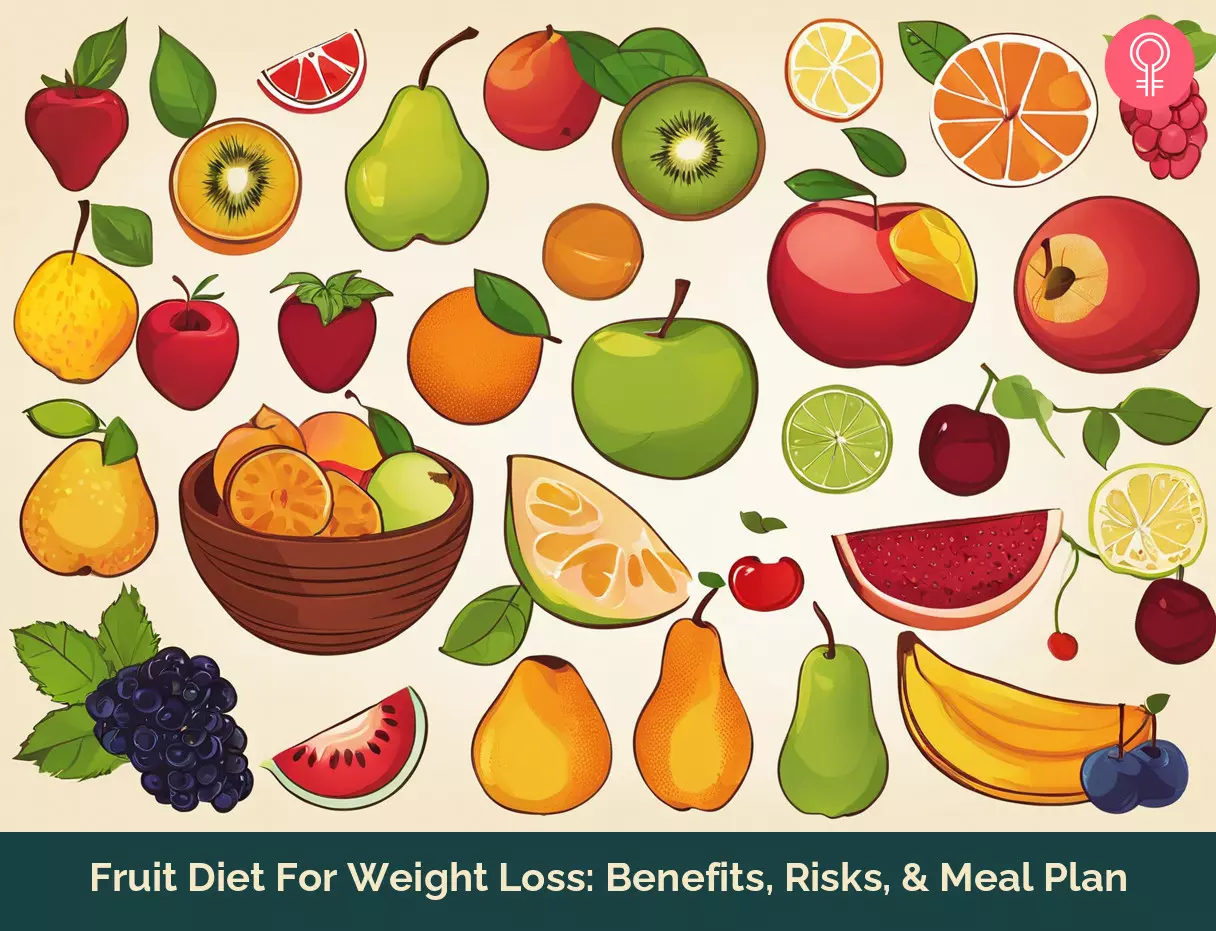
Image: Stable Diffusion/StyleCraze Design Team
The benefits of eating fruits can’t be denied. But they are also full of sugar. So, what makes them so healthy? Check out this video to debunk myths surrounding fruits and how to consume them with diabetes.
References
Articles on StyleCraze are backed by verified information from peer-reviewed and academic research papers, reputed organizations, research institutions, and medical associations to ensure accuracy and relevance. Read our editorial policy to learn more.
- Fruits for prevention and treatment of cardiovascular diseases
https://www.ncbi.nlm.nih.gov/pmc/articles/PMC5490577/ - Fruitarian diet and blood glucose control in type 1 diabetes: A case report
https://www.ncbi.nlm.nih.gov/pmc/articles/PMC8904176/ - Whole fruits and fruit fiber emerging health effects
https://www.ncbi.nlm.nih.gov/pmc/articles/PMC6315720/ - Nutritional significance of fruit and fruit products in the average Polish diet
https://www.ncbi.nlm.nih.gov/pmc/articles/PMC8235518/ - Main nutritional deficiencies
https://www.ncbi.nlm.nih.gov/pmc/articles/PMC9710417/ - Vitamin C (ascorbic acid)
https://www.ncbi.nlm.nih.gov/books/NBK499877/ - Electrolytes
https://www.ncbi.nlm.nih.gov/books/NBK541123/ - Fruits and their impact on the gut microbiota gut motility and constipation
https://pubmed.ncbi.nlm.nih.gov/34505614/ - Dietary fiber in irritable bowel syndrome (review)
https://www.ncbi.nlm.nih.gov/pmc/articles/PMC5548066/ - Bioactive compounds of edible fruits with their anti-aging properties: a comprehensive review to prolong human life
https://www.ncbi.nlm.nih.gov/pmc/articles/PMC7698232/ - Paradoxical Effects of Fruit on Obesity
https://www.ncbi.nlm.nih.gov/pmc/articles/PMC5084020/ - Fruit and vegetable intake in relation to gastric cancer risk: A comprehensive and updated systematic review and dose-response meta-analysis of cohort studies
https://www.ncbi.nlm.nih.gov/pmc/articles/PMC9939448/ - Cutaneous lesions and vitamin B12 deficiency
https://www.ncbi.nlm.nih.gov/pmc/articles/PMC2294086/ - Protein for life: review of optimal protein intake sustainable dietary sources and the effect on appetite in ageing adults
https://www.ncbi.nlm.nih.gov/pmc/articles/PMC5872778/ - Similarities and differences in the nutritional composition of nuts and seeds in Serbia
https://www.ncbi.nlm.nih.gov/pmc/articles/PMC9523690/ - The relationship between the intake of fruits vegetables and dairy products with hypertension: Findings from the STEPS study
https://bmcnutr.biomedcentral.com/articles/10.1186/s40795-023-00756-3 - Associations between fruit consumption and home blood pressure in a randomly selected sample of the general Swedish population
https://www.ncbi.nlm.nih.gov/pmc/articles/PMC9180314/ - Effects of coffee on the gastro-intestinal tract: a narrative review and literature update
https://www.ncbi.nlm.nih.gov/pmc/articles/PMC8778943/
Read full bio of Karin Littleton
Read full bio of Himanshi Mahajan
Read full bio of Ravi Teja Tadimalla
Read full bio of Moksha Gandhi







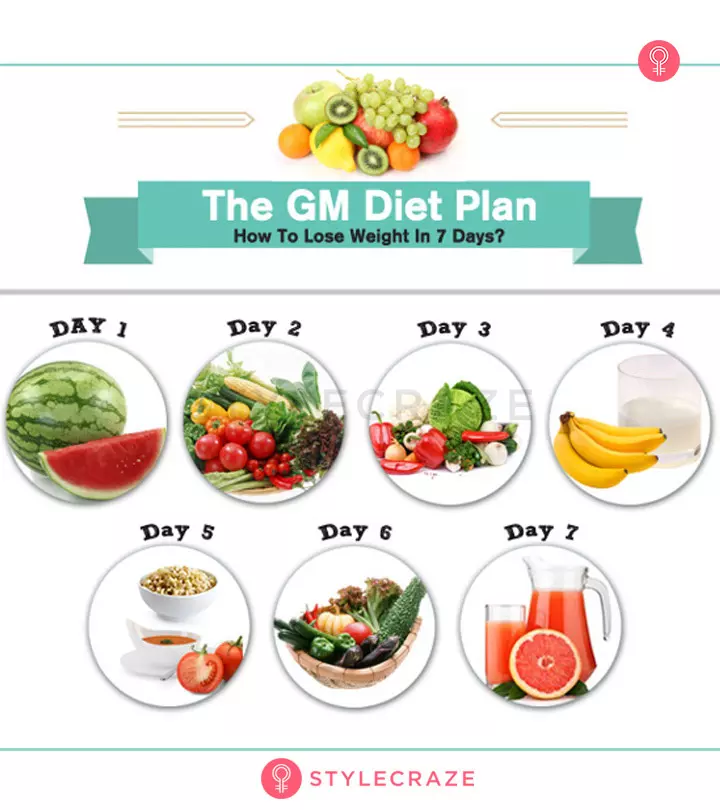



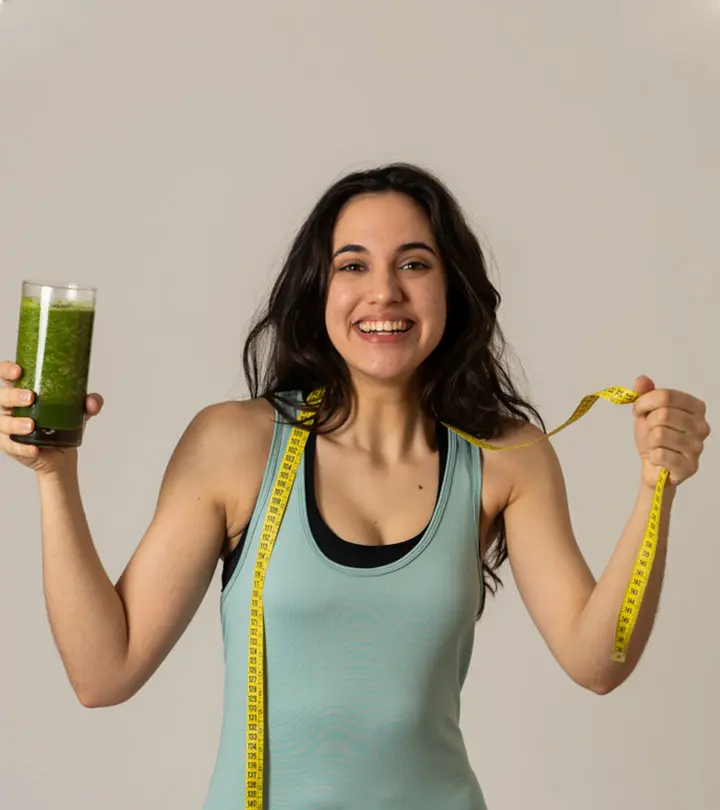






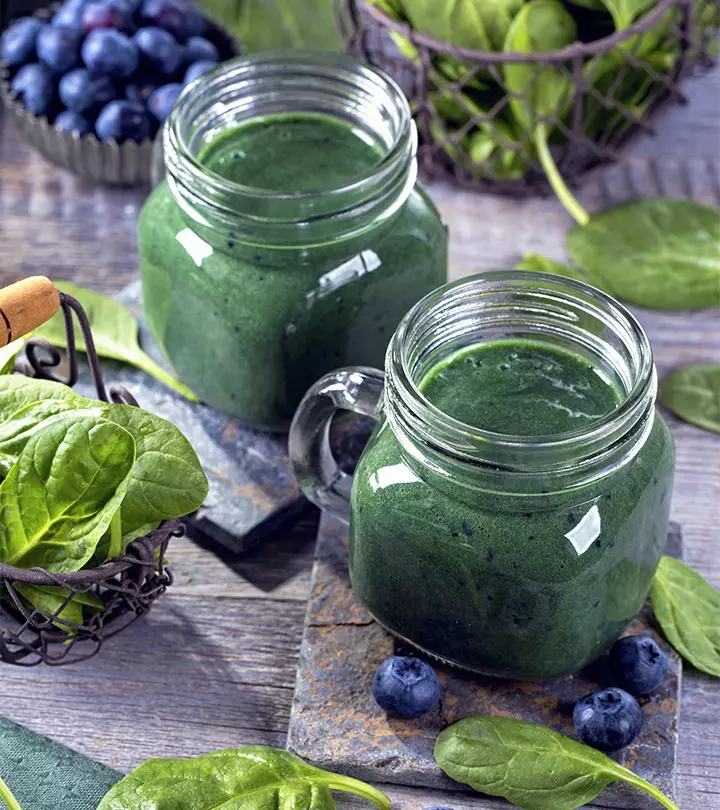

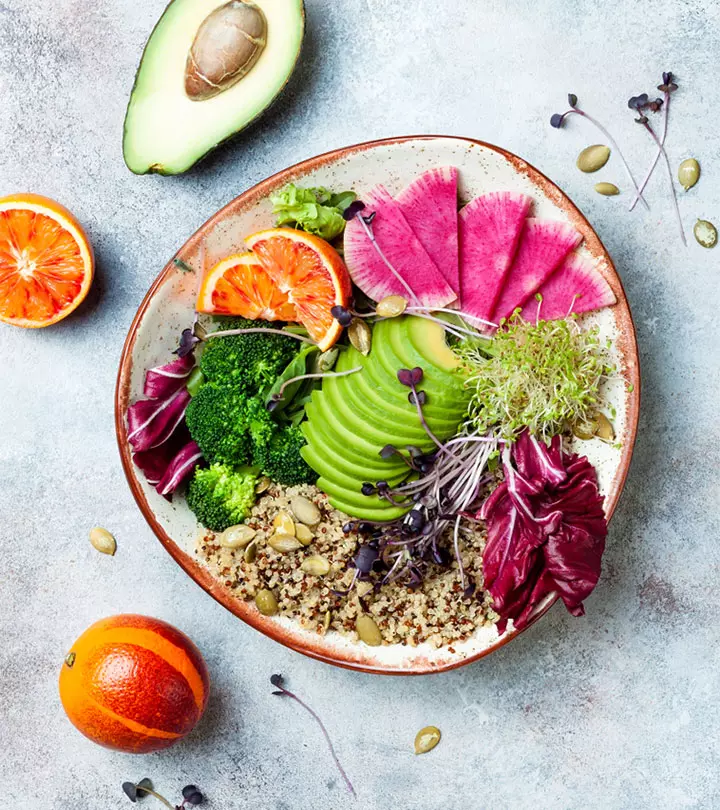






Community Experiences
Join the conversation and become a part of our empowering community! Share your stories, experiences, and insights to connect with other beauty, lifestyle, and health enthusiasts.